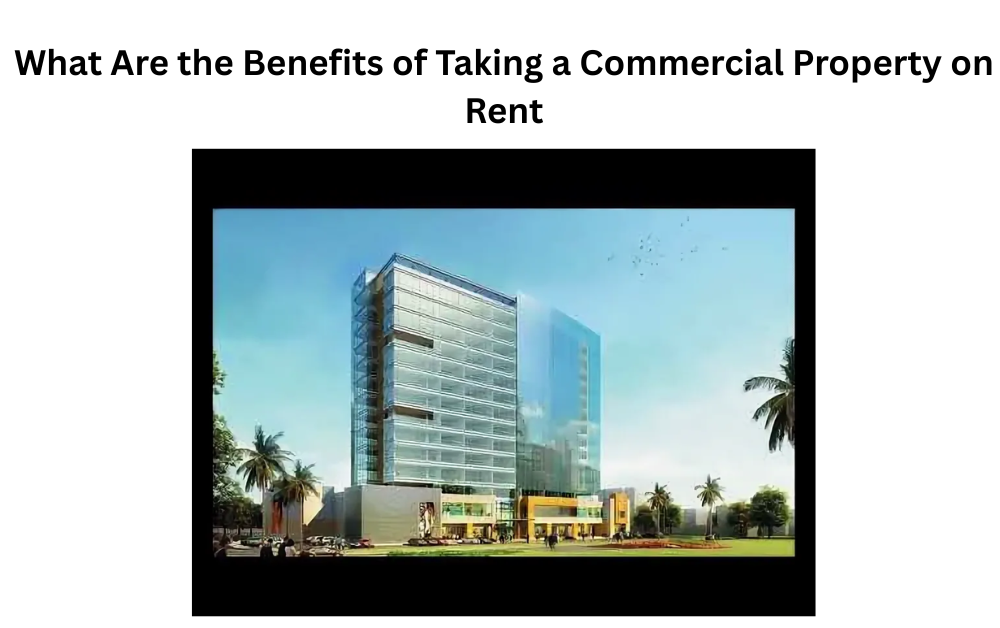What Are the Benefits of Taking a Commercial Property on Rent

Finding the right space for your business is one of the biggest decisions an entrepreneur or company has to make. Many people wonder whether it is better to buy a property or simply rent it. While owning can look attractive in the long run, renting a commercial property has its own strong advantages. Renting offers flexibility, reduces financial risk, and makes it easier for businesses to adapt to changing needs.
In this blog, we will explore in detail the benefits of taking a commercial property on rent, so you can make a smart and confident decision for your business.
Note: Find the ideal commercial property in Thane on rent with modern facilities, prime locations, and flexible spaces designed to meet your business needs.
Why Renting Commercial Property Is a Popular Choice

Businesses of all sizes, from startups to big companies, often prefer renting over buying. The reason is simple – renting gives freedom. When you rent, you are not tied down to one place forever. You can move, upgrade, or expand without having to sell or manage ownership responsibilities.
For example, a new startup may not know how big they will grow in two years. Renting helps them start in a small office and later move to a bigger one without large investments. This flexibility is a big reason why commercial rentals are so popular.
Financial Benefits of Renting Commercial Property
Lower Initial Investment
Buying a property requires a huge down payment, legal charges, taxes, and maintenance costs. For many businesses, this is a heavy financial burden at the start. Renting, on the other hand, only requires a security deposit and monthly rent. This helps companies use their money wisely for other important needs such as marketing, hiring, or upgrading technology.
Easy Cash Flow Management
When you rent, you know your monthly expense in advance. Rent remains a fixed cost for the agreed period, which makes planning easier. Businesses can manage their cash flow better because they do not have to worry about sudden property taxes, repair costs, or loan payments.
No Risk of Property Depreciation
Real estate values go up and down depending on the market. If you own property and the market falls, you lose value. But when you rent, you don’t carry that risk. You just use the property for your business without worrying about its resale value.
Flexibility and Convenience
Freedom to Relocate
Business needs change. Sometimes you need a bigger space, sometimes a smaller one, or sometimes you want to move closer to your clients. Renting gives you the flexibility to move without the stress of selling or managing owned property.
Easier Expansion or Downsizing
If your business grows, you can rent a larger office or commercial unit. If your business needs shrink, you can choose a smaller space and reduce costs. This adaptability is difficult when you own property.
Short-Term Commitments
Many rental agreements are flexible in duration. You can sign short-term leases if you are unsure of your future needs. This is helpful for startups, seasonal businesses, or companies testing a new market.
Access to Prime Locations
Better Visibility for Businesses
Many commercial properties for rent are located in prime business hubs, city centers, or high-traffic areas. Owning property in these locations may be too expensive, but renting makes it possible to operate from such premium spots.
Convenience for Clients and Employees
Being located in a central or well-connected area improves convenience for customers and employees. Easy transportation, nearby facilities, and a well-known location can improve your business reputation and client trust.
Reduced Responsibility for Maintenance
Landlord Handles Major Repairs
When you own property, every repair and maintenance cost falls on you. But when you rent, the landlord usually takes care of major repairs, building upkeep, and infrastructure management. This saves both time and money.
Lower Operational Stress
Your team can focus on running the business instead of managing building maintenance. This is a big relief for small businesses or startups that cannot afford dedicated staff for property management.
Legal and Tax Advantages
Fewer Legal Complications
Owning property involves legal paperwork, registrations, and sometimes disputes over ownership or zoning rules. Renting usually involves a simple rental agreement, which is easier and faster to manage.
Possible Tax Benefits
In many cases, rent paid for a commercial property can be shown as a business expense, reducing taxable income. This means you save money legally while enjoying the benefits of a professional space.
Better Use of Capital
Invest in Business Growth Instead of Property
By renting, you avoid locking a large amount of money in real estate. Instead, you can use that capital to hire skilled staff, expand your services, invest in better technology, or grow your brand. This often brings better returns compared to owning a property early on.
Opportunity to Stay Flexible with Finances
If the economy changes or your industry faces challenges, renting helps you adjust your expenses quickly. You can downsize or relocate to manage costs better, which is much harder when you own property.
Modern Facilities and Shared Amenities
Access to Updated Infrastructure
Many rented commercial spaces come with modern infrastructure such as high-speed internet, advanced security, parking, and power backup. Buying a property and upgrading all these facilities yourself can be very expensive.
Shared Amenities at Lower Cost
Some commercial rental buildings also provide shared conference rooms, cafeterias, gyms, or reception services. Renting gives you access to these facilities without the need to invest in them separately.
Reduced Risk for Startups and Small Businesses
Safe Choice for New Businesses
When you start a new business, the future is uncertain. Renting reduces the financial risk because you don’t commit to a long-term heavy investment. If the business does not work out as expected, you can close or relocate without huge losses.
Trial and Testing Opportunities
Renting allows businesses to test different locations or markets. For example, if you are unsure about opening a new branch in a city, you can rent a space first to test customer response before making a bigger decision.
Comparison: Renting vs Buying
| Feature | Renting Commercial Property | Buying Commercial Property |
|---|---|---|
| Initial Investment | Low | Very High |
| Flexibility | High | Low |
| Maintenance Responsibility | Landlord | Owner |
| Cash Flow | Predictable | Affected by Loans, Taxes, Repairs |
| Risk | Low | High (market ups and downs) |
| Expansion | Easy | Difficult |
This table shows why renting is often the better option, especially for growing businesses.
Final Thoughts
Renting a commercial property is not just about saving money. It is about freedom, flexibility, and focusing on business growth instead of real estate management. The benefits of renting include lower financial risk, better cash flow management, access to prime locations, and reduced responsibilities for maintenance.
For startups, small businesses, or companies planning to expand quickly, renting is often the smartest choice. Even large organizations prefer renting to stay flexible in today’s fast-changing market.
If you are planning to start or expand your business, consider the many advantages of taking a commercial property on rent. It can give you the right balance of cost, convenience, and growth opportunities.
Explore luxurious properties in Thane with Elite Realty Club. Our 35+ partner network provides exclusive access to the best residential, commercial, and investment opportunities. Buy, rent, and invest with ease.
For more insightful articles related to this topic, feel free to visit: mifinder.co
- Art
- Causes
- Crafts
- Dance
- Drinks
- Film
- Fitness
- Food
- Games
- Gardening
- Health
- Home
- Literature
- Music
- Networking
- Other
- Party
- Religion
- Shopping
- Sports
- Theater
- Wellness


